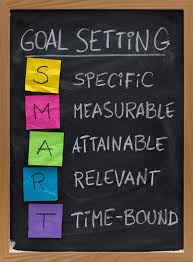Goal Setting for Elementary School Kids
The back to school season is upon us, and this is the perfect time of the year to teaching your children about goal setting! From academic (think: finishing homework on-time and accurate) to athletic (think: making the travel team) to extracurricular (think: practicing your instrument for 30 minutes a day), teaching your kids to set goals at an early age gives them a tool set they can use for the rest of their lives! Here are 5 helpful strategies to help your child set SMART goals this year.
SMART is traditionally a mnemonic device which represents criteria for a set of objectives or goals – the letters usually correspond to Specific, Measurable, Attainable, Relevant and Timely. So using the SMART acronym, here are 5 ways to help you and your children set SMART goals this year, and to stick with them!
- Specific – Children sometimes have a hard time thinking specifically. For example, if they mention that getting homework done is one of their goals, maybe suggest they set a more specific goal such as getting their homework done by a certain time each day, getting one day ahead on their homework packet, or completing their most difficult homework subject (math, anyone?) first. The more specific the goal, the easier it is to stay accountable to the goal, and to measure your effectiveness in achieving it.
- Measurable – Speaking of measurements, help your child take an active role in determining whether or not the goal has been met. Oftentimes as parents we simply assume the role of judge and juror, letting our kids know when they’ve done well or missed the mark. By inviting your child to take an active role in measuring his/her success, you help them stay accountable to the goals they set while also teaching them independence and responsibility.
- Attainable – Children (especially young children) also sometimes struggle to set realistic goals [“I promise I will NEVER do that again, mom.”] Help them think through goals that you know are realistic and attainable in the established time frame. This will help them also to feel a sense of accomplishment when the goal has been met!
- Relevant – Everything is relevant to a child, so this one is sometimes easier said than done! Try helping your children understand the word relevancy in terms they can understand. The important thing to remember with setting relevant goals is to pick goals that matter. A goal of saying the word “the” 1,000 times a day doesn’t really matter much to anyone. A more relevant goal for your child may be to finish their weekly homework assignment by Wednesday night so they have Thursday night for free time or an extra 20 minutes of computer or television. That represents a goal that matters to the child, as well as the parent.
- Timely – The last criteria for SMART goals is simply to make sure that a time frame is assigned to the goal. In other words, when do you want to achieve the goal? How quickly is it possible to achieve? Establishing an appropriate time frame also helps with measuring achievement!
Whatever the goals this year, good luck and stick to them together as a family! For help with developing proper study habits and organizational skills for your student, call Club Z! at 800-434-2582 today!

 Club Z! News
Club Z! News
- New Year, Better Grades: How Club Z! Tutoring Helps Students Succeed
- Partners in Education: How Two Club Z! Tutoring Directors Serve Families Together
- Navigating Homework Challenges: A Tutor’s Guide for Parents
- How Tutoring Can Foster a Love for Reading in Children
- Blending Psychology and Personalized Learning: A Director’s Journey with Club Z! Tutoring
- Back to School Season with Club Z! Tutoring: Tips, Tools, and Support for a Strong Start
- Making an Impact: A Club Z! Tutoring Director’s Journey of Community, Compassion, and Student Success
- Study Tools and Apps: Enhancing the Tutoring Experience
- The Impact of Social Emotional Learning in Tutoring Sessions
- Building Strong Foundations: Tutoring for Elementary School Students
 CATEGORIES
CATEGORIES
- ACT (2)
- Club Z! Tutoring (77)
- College Admission Requirements (86)
- Franchise Spotlights (1)
- Press Release (3)
- SAT (2)
 RECENT POSTS
RECENT POSTS
No matter how you look at it, college is an expensive proposition these days. Both public and private colleges and universities have had to raise fees and tuition as costs have increased. As a result, college student debt has skyrocketed and many students end up with loan payments years, sometimes even decades, after graduation. But with some careful planning and creative thinking, there are lots of other ways to help pay for college and avoid being stuck with big loan payments after graduation. One final but important step in the college application process is to include an application for financial aid.
As parents, and grandparents for that matter, we consider it to be a bit of a rite of passage to tell our children just how easy they have it compared to what we went through at their age. File this under the “when I was your age, I had to walk 2 miles to school each day, uphill both ways” category.
For any parent of a college-bound student, SAT and ACT test scores are no doubt at the center of most dinner table discussions. While no one will argue that test scores alone are the deciding factor in college admissions, and many colleges are moving toward a test-optional admissions policy, strong scores on the SAT and or ACT can definitely help a student’s chance of gaining admission to his/her college of choice.


 Cari Diaz
Cari Diaz  September 10 ,
2018
September 10 ,
2018  0 Comments
0 Comments

